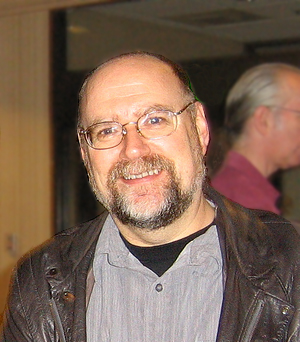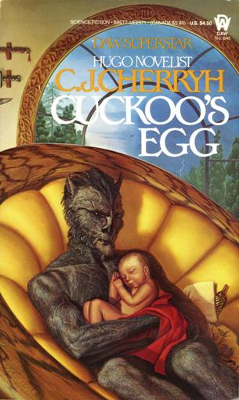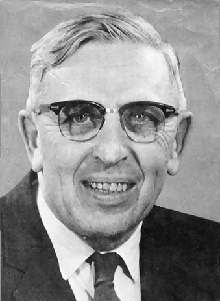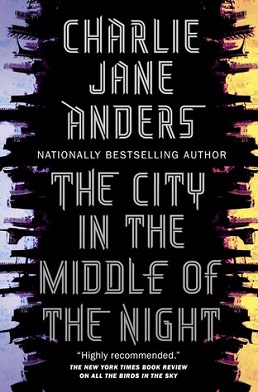
Speaker for the Dead is a 1986 science fiction novel by American writer Orson Scott Card, an indirect sequel to the 1985 novel Ender's Game. The book takes place around the year 5270, some 3,000 years after the events in Ender's Game. However because of relativistic space travel at near-light speed Ender himself is only about 35 years old.

The Fountains of Paradise is a 1979 science fiction novel by British writer Arthur C. Clarke. Set in the 22nd century, it describes the construction of a space elevator. This "orbital tower" is a giant structure rising from the ground and linking with a satellite in geostationary orbit at the height of approximately 36,000 kilometres. Such a structure would be used to raise payloads to orbit without the expense of using rockets. The novel won both the Hugo and Nebula Awards for Best Novel.

Robert Charles Wilson is an American-Canadian science fiction author.

Robert James Sawyer is a Canadian and American science fiction writer. He has had 25 novels published and his short fiction has appeared in Analog Science Fiction and Fact, Amazing Stories, On Spec, Nature, and numerous anthologies. He has won many writing awards, including the best-novel Nebula Award (1995), the best-novel Hugo Award (2003), the John W. Campbell Memorial Award (2006), the Robert A. Heinlein Award (2017), and more Aurora Awards than anyone else in history.

Lucifer's Hammer is a science fiction post-apocalypse-survival novel by American writers Larry Niven and Jerry Pournelle that was first published in 1977. It was nominated for the Hugo Award for Best Novel in 1978. Two issues of a planned six-part comic book adaptation were published by Innovation Comics in 1993.

Way Station is a 1963 science fiction novel by American writer Clifford D. Simak, originally published as Here Gather the Stars in two parts in Galaxy Magazine in June and August 1963. Way Station won the 1964 Hugo Award for Best Novel.

"The Scapegoat" is a science fiction novella by American writer C. J. Cherryh, set in her Alliance-Union universe. It deals with a war in which the two opposing species can not communicate with one another and do not know how to stop the conflict. The work was originally published in the 1985 anthology of military science fiction Alien Stars and was nominated for the Hugo Award for Best Novella.

Cuckoo's Egg is a science fiction novel by American writer C. J. Cherryh, which introduces a fictional race raising a human boy. It was published by DAW Books in 1985, and there was also a limited hardcover printing by Phantasia Press in the same year. The book was nominated for the Hugo Award and longlisted the Locus Award for Best Novel. It was later reprinted along with Cherryh's novel Serpent's Reach in the 2005 omnibus volume The Deep Beyond.

River of Gods is a 2004 science fiction novel by British writer Ian McDonald. It depicts a futuristic India in 2047, a century after its independence from Britain, characterized both by ancient traditions and advanced technologies such as artificial intelligences, robots and nanotechnology. The novel won the British Science Fiction Award in 2004 and was nominated for a Hugo. It was followed by a short story collection called Cyberabad Days in 2009.
The Trigon Disunity is a series of three books written by science fiction author Michael P. Kube-McDowell. Emprise was a Philip K. Dick Award nominee, and placed second in the annual Locus Poll for best first novel. The first edition covers were by Ron Miller.

Thorns is a science fiction novel by American author Robert Silverberg, published as a paperback original in 1967, and a Nebula and Hugo Awards nominee.

The War of the Worlds is a 1953 American science fiction thriller film directed by Byron Haskin, produced by George Pal, and starring Gene Barry and Ann Robinson. It is the first of several feature film adaptations of H. G. Wells' 1898 novel of the same name. The setting is changed from Victorian era England to 1953 Southern California. Earth is suddenly invaded by Martians, and American scientist Doctor Clayton Forrester searches for any weakness to stop them.
Hauser's Memory is a 1970 science fiction television movie directed by Boris Sagal and that starred David McCallum, Susan Strasberg, Lilli Palmer, Robert Webber and Leslie Nielsen. The screenplay by Adrian Spies was based on a 1968 novel of the same name by Curt Siodmak, which reworked the central idea of his novel Donovan's Brain (1943).

Ash is a fictional character in the film Alien (1979) portrayed by actor Ian Holm who, while known in the UK as a stage actor, was at the time unknown to American audiences. Ash serves as the secondary antagonist of the first film. The character is the science officer of the Nostromo, who breaks quarantine by allowing Kane, a member of the crew, back on board after he has been infected by an alien life form. It is later discovered that Ash is not human as he appears, but a Hyperdyne Systems 120-A/2 android, a sleeper agent who is acting upon secret orders to bring back the alien lifeform and considers the crew and cargo to be expendable.
The anthropologist Leon E. Stover says of science fiction's relationship to anthropology: "Anthropological science fiction enjoys the philosophical luxury of providing answers to the question "What is man?" while anthropology the science is still learning how to frame it". The editors of a collection of anthropological SF stories observed:
Anthropology is the science of man. It tells the story from ape-man to spaceman, attempting to describe in detail all the epochs of this continuing history. Writers of fiction, and in particular science fiction, peer over the anthropologists' shoulders as the discoveries are made, then utilize the material in fictional works. Where the scientist must speculate reservedly from known fact and make a small leap into the unknown, the writer is free to soar high on the wings of fancy.

Clifford Donald Simak was an American science fiction writer. He won three Hugo Awards and one Nebula Award. The Science Fiction Writers of America made him its third SFWA Grand Master, and the Horror Writers Association made him one of three inaugural winners of the Bram Stoker Award for Lifetime Achievement. He is associated with the pastoral science fiction subgenre.

Death's End is a science fiction novel by the Chinese writer Liu Cixin. It is the third novel in the trilogy titled Remembrance of Earth's Past, following the Hugo Award-winning novel The Three-Body Problem and its sequel, The Dark Forest. The original Chinese version was published in 2010. Ken Liu translated the English edition in 2016. It was a finalist for the 2017 Hugo Award for Best Novel and winner of the 2017 Locus Award for Best Science Fiction Novel.

The Stone Sky is a 2017 science fantasy novel by American writer N. K. Jemisin. It was awarded the Hugo Award for Best Novel, the Nebula Award for Best Novel, and the Locus Award for Best Fantasy Novel in 2018. Reviews of the book upon its release were highly positive. It is the third volume in the Broken Earth series, following The Fifth Season and The Obelisk Gate, both of which also won the Hugo Award.

The Murderbot Diaries is a science fiction series by American author Martha Wells, published by Tor Books. The series is told from perspective of the titular cybernetic SecUnit, who was owned by a futuristic megacorporation. Murderbot manages to free itself from enslavement, but instead of killing its masters, it staves off boredom of security work watching media. As it spends more time with a series of caring people, it starts developing friendships and emotional connections, which it finds inconvenient.

The City In the Middle of the Night is a 2019 climate-fiction novel by Charlie Jane Anders. It is set on a tidally locked planet, where human life, surrounded by hostile alien life, is mostly divided between two archetypically different urban sites. The main story focuses on two characters whose actions take them outside of the cities.

















